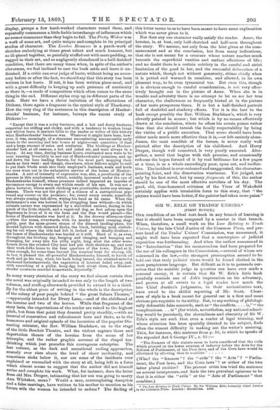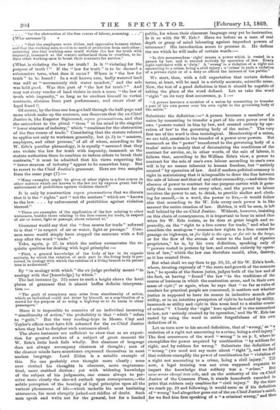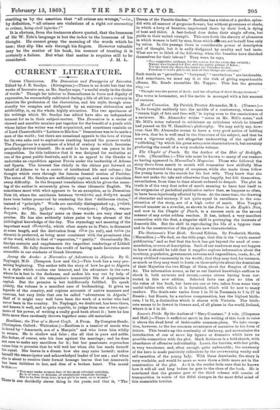SIR W. ERLE ON TRADES' UNIONS.*
[FIRST NOTICE.]
ONE condition of an ideal text-book in any branch of learning is that it should have been composed by a master in that branch. When, therefore, a small work on the Law Relating to Trade Unions, by the late Chief Justice of the Common Pleas, and present head of the Trades' Unions' Commission, was announced, it might well have been expected that a masterpiece of judicial exposition was forthcoming. And when the author announced in his " Introduction " that his memorandum had been prepared for the use of his colleagues in the Commission,—several of whom are unlearned in the law,—the strongest presumption seemed to be held out that truly judicial views would be found clothed in the most perspicuous language. But difficult as it is to persuade our
selves that the amiable judge in question can have ever made a personal enemy, it is certain that Sir W. Erie's little book
painfully reminds one of Job's imprecation on his adversary, and proves at all events to a legal reader bow much the late Chief Justice's judgments, in their authoritative text, have owed to the skilful reporting of Mr. Scott. Clearness of style in a book meant for general use is a first and most obvious pre-requisite to its utility. But, to say nothing of philologically defensible false concords, such as " the conflicts. . . . is," "the complications. . . is" (for which, nevertheless, any national schoolboy would be punished), the slovenliness and obscurity of Sir IV. Erie's style are such that even a reader of legal training, and
whose attention has been specially directed to his subject, finds often the utmost difficulty in making out the writer's meaning. Take, for instance, this sentence from p. 56, in which he speaks of the repealed Act 5 George IV., e. 95
"The framers of this statute seem to have considered that the evils which pressed on the lower stratum of industry before the Acts for the Reform of Parliament, of the Poor laws, and of the Corn laws would be
alleviated by allowing diem to combine."
(Who? the " framers " ? the " evils" ? the " Acts " ? "Parlia ment, the Poor laws, and the Corn laws " ? or either of the two latter plural entities? The present critic has tried the sentence on several interpreters, and finds the two prevalent opinions to be that it is either the " evils " or the "Acts of Parliament" that combine.)
. . . " for the obstruction of the free course of labour, assuming. . . ."
(Who assumes?) •
. . . . " that the employers were richer, and oppressive because richer, and that the working-men stood in no need of protection from each other ; assuming also that working-men could violate the law for truth with impunity, inasmuch as the statute authorized them to combine, to induce other working-men to break their contracts for service."
(What is violating the law for truth? Is it "violating for the purpose of truth ? " If the "law for truth" is to be deemed a substantive term, what does it mean ? Where is "the law for truth" to be found ? In a well known case, badly watered land was sold as "uncommonly rich water meadow," and the sale was held good. Was this part of "the law for truth ? " And may not every vendor of land violate in such a sense "the law of truth with impunity," so long as he confines himself to verbal contracts, abstains from part performance, and steers clear of legal fraud ?) Of course, by the time one has got half through the half-page and more which make up the sentence, one discovers that the ex-Chief
Justice is, like Emperor Sigismund, supra granunaticam, and that the antecedent to the plural " them " in his mind is the singular "lower stratum of industry," which "combines for the obstruction
of the free course of trade." Considering that the statute referred to applies not only to workmen generally, but (s. 3) to "masters, employers, and other persons," of all of whom, according to Sir W. Erie's peculiar phraseology, it is equally "assumed that they can violate the law for truth with impunity, inasmuch as the statute authorizes them to combine to induce others to break their contracts," it must be admitted that his views respecting the "lower stratum of industry" appear to be somewhat hazy. But to revert to the Chief Justice's grammar. Here are two samples from the same page (7) :—
" Many examples might be given of other rights to a free course in other matters which are known to the law not by express grant, but by enforcement of prohibition against violation thereof."
It is only by construction supra grammaticcan that we discern that it is the " rights " and " not the matters" which are "known
to the law. . . . by enforcement of prohibition against violation thereof."
"These are examples of the application of the law relating to other nuisances, besides those relating to the free course for trade, in respect of air or water, light or passage, above referred to."
Grammar would say that the "free course for trade" referred to is that "in respect of air or water, light or passage." Common sense would simply have stopped the sentence with a full stop after the word "trade."
Take, again, p. 27, in which the author enumerates the requisite qualities for dealing with legal principles :—
" First, a general knowledge of the body of law in its organic entirety, by which the relation of each part to the living body is perceived, in analogy with which the relation of a living branch to its parent tree is understood."
By "in analogy with which" the ex-judge probably meant "in analogy with that [knowledge] by which."
The last instance (p. 33) soars to such a height above the level plains of grammar that it almost baffles definite interpretation :—
" The guilt of conspiracy may arise from simultaneity of action, which an individual could not incur by himself, as a combination of a crowd for the purpose of so using a highway as to do harm to other passengers."
Since it is impossible to conceive of an individual incurring "simultaneity of action," the probability is that " which " refers
to "guilt." But the very reading-boys in Messrs. Clay and Taylor's offices must have felt ashamed for the ex-Chief Justice when they had to decipher such sentences aloud.
The above instances are sufficient to show that as an exposition for general readers of a subject of great moment Sir W. Erie's little book fails wholly. But clearness of language does not always accompany clearness of thought ; men of the clearest minds have sometimes expressed themselves in most unclear language. Lord Eldon is a notable example of this. No one probably ever thought more clearly ; none ever clothed his thoughts in obscurer, more ungrammatical, more crabbed diction ; yet with widening knowledge of the subject of his judgments, one comes always to perceive more clearly the shrewd outlook upon consequences,—the subtle perception of the bearing of legal principles upon all the various phenomena of life—which underlie his most hesitating utterances, his most abruptly jerked-out riddles of doubt. Such men speak and write not for the general, but for a limited public, for whom their obscurest language may yet be instructive. Is it so with Sir W. Erie? Have we before us a man of real depth or grasp of mind labouring against imperfect powers of utterance? His introduction seems to promise it. He defines. the use which he will make of certain words :—
" In this memorandum right' means a power which is vested in a person by law, and is created entirely by operation of law. Every right correlates with a duty.' A wrong' is a violation of a right not amounting to a crime, being a civil injury ; a crime' is such a violation of a private right or of a duty as affects the interest of the public."
We start, then, with a full expectation that certain defined terms, at least, will be used in a strictly accurate, scientific sense.
Now, the test of a good definition is that it should be capable of taking the place of the word defined. Let us take the word " right " on its very first occurrence, p. 1 :—
" A person becomes a member of a union by consenting to transfer a part of his own power over his own rights to the governing body of the union."
Substitute the definition :—" A person becomes a member of a union by consenting to transfer a part of his own power over his own 'powers vested in him by law, and created entirely by ope ration of law' to the governing body of the union." The very first use of the word is thus tautological. Membership of a union, we are told, consists in the transfer of a power over powers. But inasmuch as the "power" transferred to the governing body of & trades' union is mainly that of determining the conditions of the contract for service, or, in other words, of the sale of labour, it follows that, according to Sir William Erie's view, a power to contract for the sale of one's own labour according to one's own will is by no means inherent to human freedom, but "entirely created" by operation of law. And if modern political economy is right in maintaining that it is impossible to draw the line between the sale of labour and that of any other commodity,—and since the absence of power to contract for one purpose carries with it generally that to contract for every other, and the power to labour involves the power to eat, to drink, to provide shelter and clothing for oneself,—in a word, the power to live,---it would follow also that according to Sir W. Erie every such power is in like manner the entire creation of law. Hobbes, it will be seen, is left well behind by the ex-Chief Justice. Without, however, insisting
on this chain of consequences, it is important to bear in mind that when Sir W. Erle insists, as he does at great length and repeatedly, on the "right to a free course for trade," and what he considers the analogous "common-law rights to a free course for passage on highways, or for light to the eyes, or for air to the lungs, or for the flow of the stream of water to the land of riparian proprietors," he is, by his own definition, speaking only of "powers vested in persons by law, and created entirely by operation of law," which the law can therefore mould, alter, destroy, as it has created tbem.
But what shall we say then to pp. 50,51, of Sir W. Erle's book, where, treating expressly of "the roots and growth of the common
law," he speaks of the Saxon juries, judges both of the law and of the fact, as having " found " the law "in the traditions of the course of business in which the contention arose, and in their own sense of right ;" or again, when he says that "so far as rules of conduct for practical people are concerned, it matters not whether justice is supposed to have its source in inductive search after utility, or in an intuitive perception of right to be tested by utility, inasmuch as utility and right in this sense lead to a similar course
of action " ? Clearly the ' right ' here spoken of is one antecedent to law, not entirely created by its operation,' and Sir W. Erie has ended by using the word in entire forgetfulness of his own definition of it.
Let us turn now to his second definition, that of 'wrong,' as " violation of a right not amounting to a crime, being a civil injury." The first occurrence of the word " wrong " is on p. 2, where he exemplifies the power acquired by combination "by soldiers for right, and by robbers for wrong." Substitute the definition of " wrong" (we need not say more about " right "), and we find that robbers exemplify the power of combination for "violation of a right not amounting to a crime, being a civil injury." Till now, a legal training was not even supposed requisite to
impart the knowledge that robbery was a "crime." But noes areas change tout cela, and on the authority of the ex-Cluef
Justice of the Common Pleas, it stands henceforth recorded in print that robbers only combine for "civil injury." By the tame
we reach pp. 29 and following, it would seem as if his definition of "wrong" had altogether gone out of the ex-Chief Justice mind, for we find him first speaking of a "a criminal wrong," and then startling us by the assertion that "all crimes are wrongs,"—i.e., by definition, "all crimes are violations of a right not amounting to crimes, being civil injuries!"
It is obvious, from the inbtances above quoted, that the looseness of Sir W. Erie's language is but the index to the looseness of his thought. He cannot grasp the meaning of the words which he uses ; they slip like eels through his fingers. However valuable may be the matter of his book, his manner of treating it is certainly a failure. But what that matter is requires still to be considered. J. M. L.
































 Previous page
Previous page